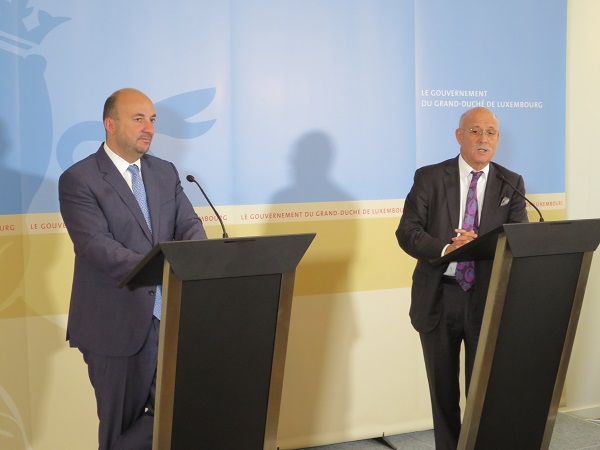
At a press conference following the Luxembourg Sustainability Forum last Thursday, the Luxembourg Ministry of the Economy announced the launch of a major strategic study, 'The Third Industrial Revolution Study', through which American economist Jeremy Rifkin will attempt to identify and facilitate the long-term establishment of a new economic model in the Grand Duchy.
The study, to be carried out in collaboration with the Chambre de Commerce and Inspiring More Sustainability (IMS) Luxembourg, will examine how an economic model could be drawn up from an intelligent network of information and communications technology (ICT), energy and transport.
Economist Jeremy Rifkin has been welcomed aboard as project leader, contributing his experience advising the EU and various regions such as Nord-Pas-de-Calais in France and the Utrecht province of the Netherlands on developing and implementing sustainable growth concepts.
The study will employ Rifkin's premise that the cross-over of internet communication and renewable energy generates a third Industrial Revolution, as detailed in his 2011 book "The Thirs Industrial Revolution; How Lateral Power is Transforming Energy, the Economy and the World".
Based on a sharing economy, the world imagined by Jeremy Rifkin would be characterised by the development of intelligent systems capable of greater adaptability, through a more efficient allocation of resources and an interconnection of systems. This revolution would be brought about primarily through a shift to renewable energies, a wide-scale deployment of energy storage technologies and the implementation of an Internet technology which transforms energy and transport into an intelligent network.
"Conceptually, Luxembourg has already been for a while in the process of successfully developing sectors like ICT, environmental technologies and logistics as well as deploying the necessary technological infrastructure to concretely decline the idea of Jeremy Rifkin," commented Deputy Prime Miister, Minister for the Economy, Étienne Schneider at the press conference. "This would for example involve the development of broadband networks at the national level, the planned installation of 850 public terminals for recharging electric cars throughout the country by 2020 or even the introduction from 2016 - throughout the country - of smart meters for electricity and gas. Accordingly, the starting position for the success of our challenge is promising".
Jeremy Rifkin revealed that this study will represent the first time that he will carry out such a project for an entire country, stating: "We aim to draw on megatrends for the implementation of a fully interconnected economy in Luxembourg, able to establish itself as a major player in the European forefront. The Grand Duchy could therefore become the ideal laboratory to test these various innovative and intelligent ideas to actual size and on a national scale. Luxembourg will mutate into a 'living lab' and will be the forerunner of the necessary solutions to addressing the major challenges of the future".
Carlo Thelen, Director General of the Chambre de Commerce, a partner in the project, continued: "We welcome the Government's initiative to consolidate this approach through our longstanding model of economic success. We willingly partnered with this important project which will benefit both businesses and citizens. The Chambre de Commerce will invest itself in sensitising and mobilising the economic decision makers for this joint project. This collective mobilisation will create a momentum which will allow us, if necessary, to again take one or more steps ahead of other countries".
"Sustainability is an integral part of Jeremy Rifkin's Third Industrial Revolution," concluded President of IMS, Christian Scharff. "As the largest national network accompanying organisations in their commitment to Corporate Social Responsibility, we are proactively contributing to this important initiative and fulfilling our role as a catalyst for social innovation. In this way, it is our goal to incite Luxembourg companies to work as major levers of transformation".
The study is expected to take at least ten months to complete, involving the identification of new models of production, exchange and consumption.
Photo by Luxembourg Government (L-R: Luxembourg Deputy Prime Minister, Minister for the Economy Étienne Schneider; American economist Jeremy Rifkin)








